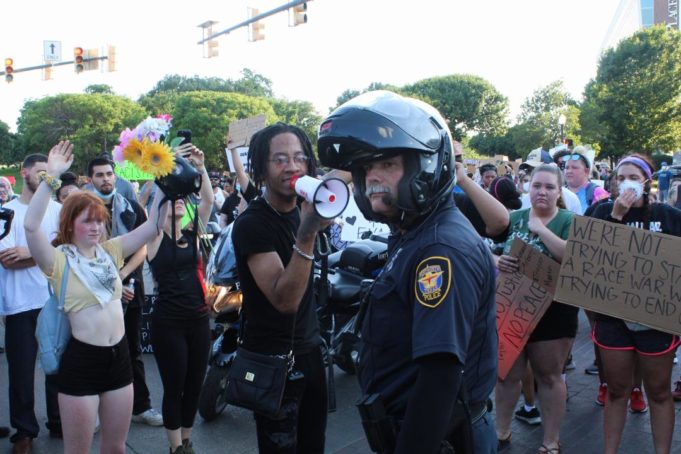Traffic along at the intersection of University Drive and West 7th Street sat at a standstill early last evening as a few hundred protesters occupied the circular intersection and shouted, “Hands up, don’t shoot!”
At the north end of the circle, a white police officer whose badge read, “Ritchie” stood surrounded by a few dozen shouting protesters. One event organizer, who goes by LUCID SHINOBI, handed the officer a megaphone. Ritchie was hesitant to respond to the gesture, but he eventually relinquished.
“Let me tell you something,” the officer told the crowd. “When you see a white car and a black car, do you think about the people in those cars? Do you not like [one car over the other]? It’s just a paint job. You have no idea who is inside. Just like this uniform, you don’t know me.”
“I can’t take this black skin off!” one man shouted before being hushed.
“You don’t know my kids,” and you don’t know me, the officer continued. “There are bad apples. We make mistakes as police officers. We try to root the bad officers out.”
Mdot White (a local standup comedian, as I found out later) stopped the retreating officer.
“If you meant what you just said, I’m going to come give you a hug,” White said.
Shortly after embracing, White drew laughs by quipping, “I’ve got warrants, so I gotta go!”
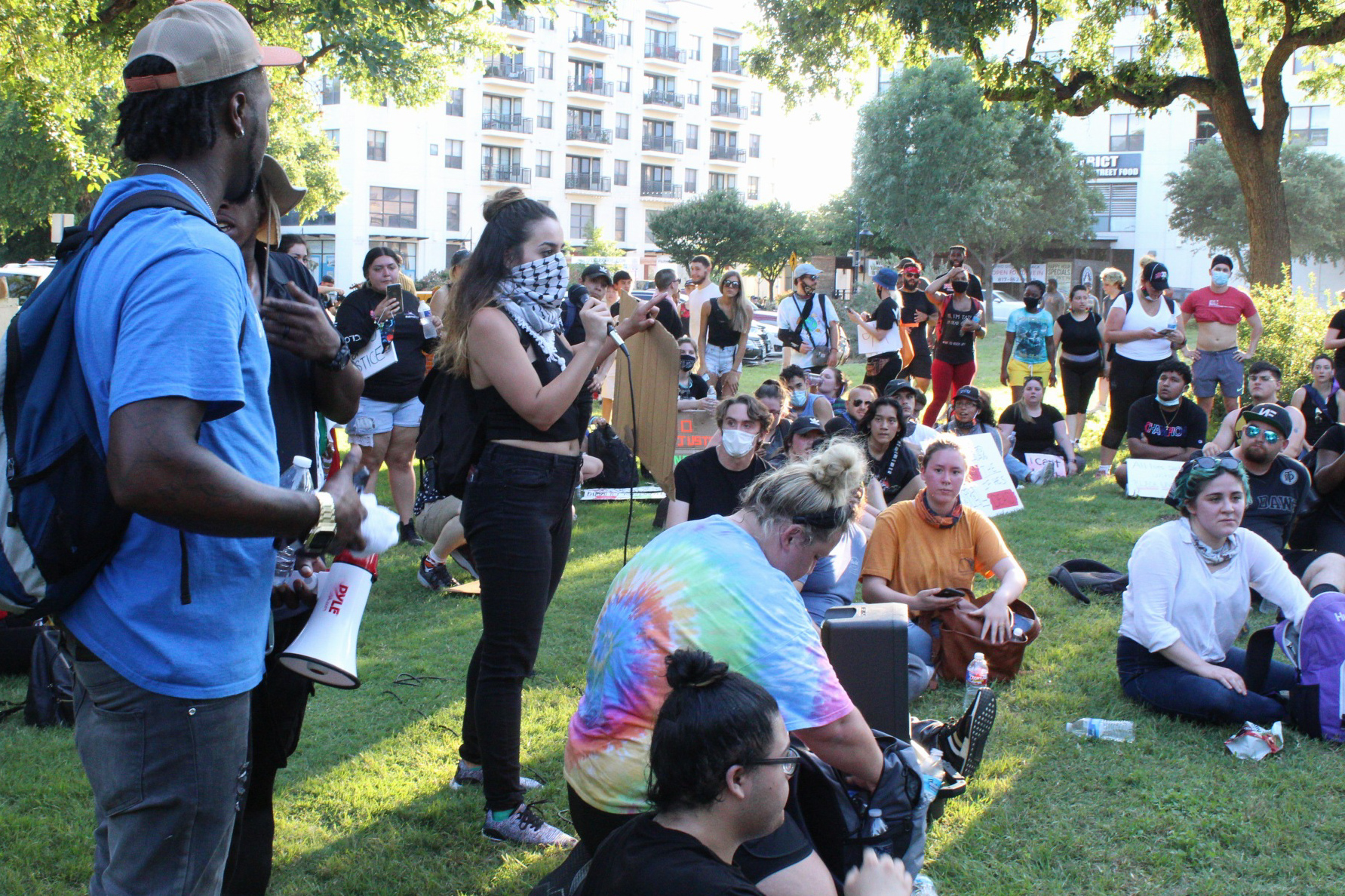
The crowd then turned southward toward dozens of boarded-up West 7th corridor shops but soon turned away. The crowds blocked me from seeing why, but a megaphone order of “I need to protect y’all” suggested a wall of police blocked the path toward Crockett Row at the West 7th development. From what I observed, the protesters were there to show solidarity with victims of hate crimes, not to loot.
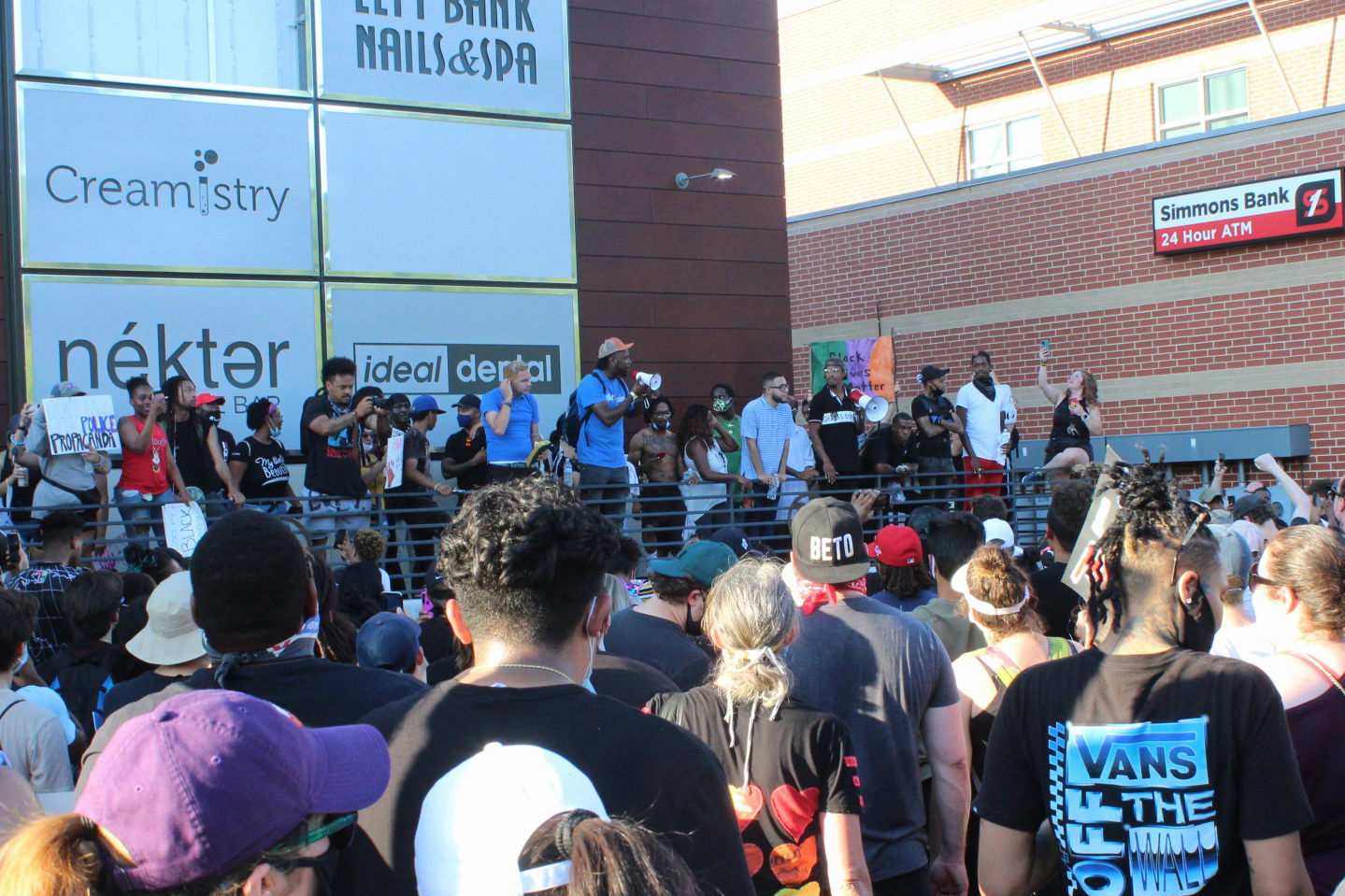
This was the sixth day of protests in Fort Worth and all over the country in response to the murder of George Floyd, the 46-year-old black man who died after a white police officer pressed his knee to Floyd’s neck during an attempted arrest in Minneapolis last week. While the resulting national riots have heavily invoked Floyd’s name, many black protesters yesterday said Floyd’s death was simply the “tipping point” after years of frustration over police shootings of unarmed black men and women.
The protesters chose the Fort Worth Police and Firefighters Memorial near the West 7th bridge to rest and recuperate. Just a few minutes after gathering in the shade of overhanging oak trees, swells of protesters coming from downtown could be seen crossing the bridge. Cheers from both sides erupted as the West 7th protesters began rushing toward their compatriots on the other side. For the marchers who were tear-gassed at the same bridge just days earlier, the moment was noticeably emotional. Video footage of the large rendezvous was shared by CNN later that day.
At the park, I chatted with White, who described steps he takes to protect his life when he is pulled over by police.
“In my situation, there are a few things I do when I get pulled over,” he said. “I gotta get out of the car. I make sure I have my license and insurance in my hand. I walk to the back of my car. I won’t get back into my car. I make sure there a lot of people around. I’m not going to get into a car because that is where most shootings happen. If I’m out of the car, I’m in front of their camera. If I do die, at least it will not be justified. You see what happened with George Floyd because it was recorded. That needs to change.”
His advice for white witnesses of hate crimes: If you see something, do something.
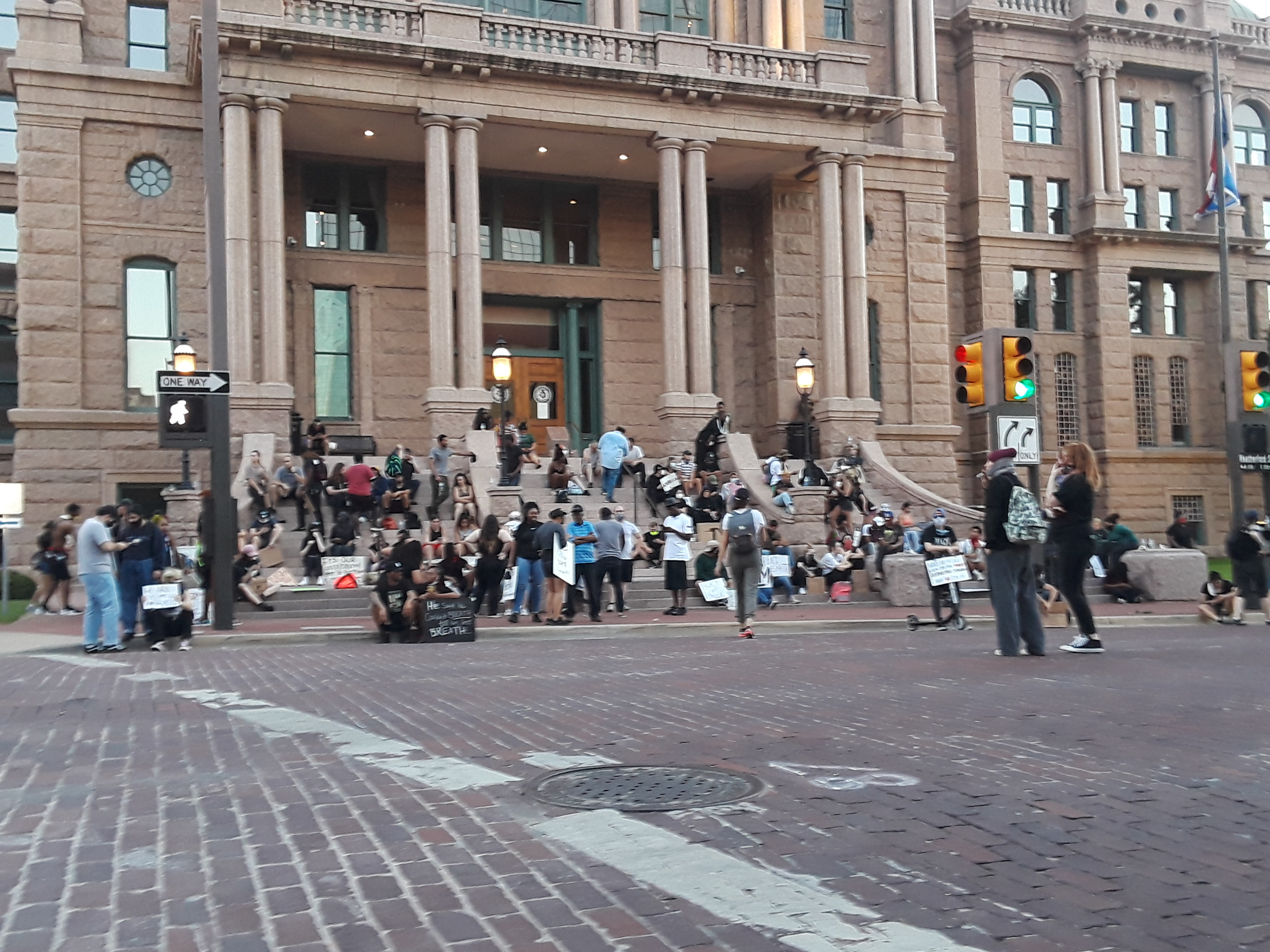
As the 8 p.m. curfew approached, I made my way downtown. The previous evening saw dozens of Fort Worth police bike officers scrambling to contain a spontaneous march through downtown (“Largest Yet Tuesday Protest Ends Peacefully,” June 3, 2020). Last night was comparatively far more subdued. A crowd of just under 100 sprawled across the steps of Tarrant County Courthouse. The gathering was small enough that Fort Worth police reopened Weatherford Street to traffic. Many cars honked in solidarity as they drove by that evening.
One Black Lives Matter activist who asked to go by BLACK gave a speech.
Any system built on racism has “no choice but to continue to produce police brutality,” he said. “It has no choice but to continue to murder back lives. Our city burned down the day they killed Atatiana Jefferson. If a riot happens, we didn’t start that shit. They started it when they stole African people from their own homelands to bring us here to work for stolen labor. What do I say for a country that does that? When you burn it down, out of the ashes grows something humane, just, and righteous. [Mayor] Betsy Price wants to have a city council meeting tomorrow. We’ve been coming to your meetings. The time is now for you to come here. Bring your ass out here, and you will hear what the city has to say. You bring the city council meeting to us, then we will believe that you are for us.”
Protest organizers plan to rally outside City Hall today ahead of a 3 p.m. city council meeting. United Fort Worth, a multiracial grassroots community organization, is calling of Fort Worth police chief Ed Kraus to drop all charges on protesters who have been arrested. Multiple sources place that number at around 50. Tarrant County jail has been described as a cesspool where no steps are being taken to prevent the spread of disease, including COVID-19.
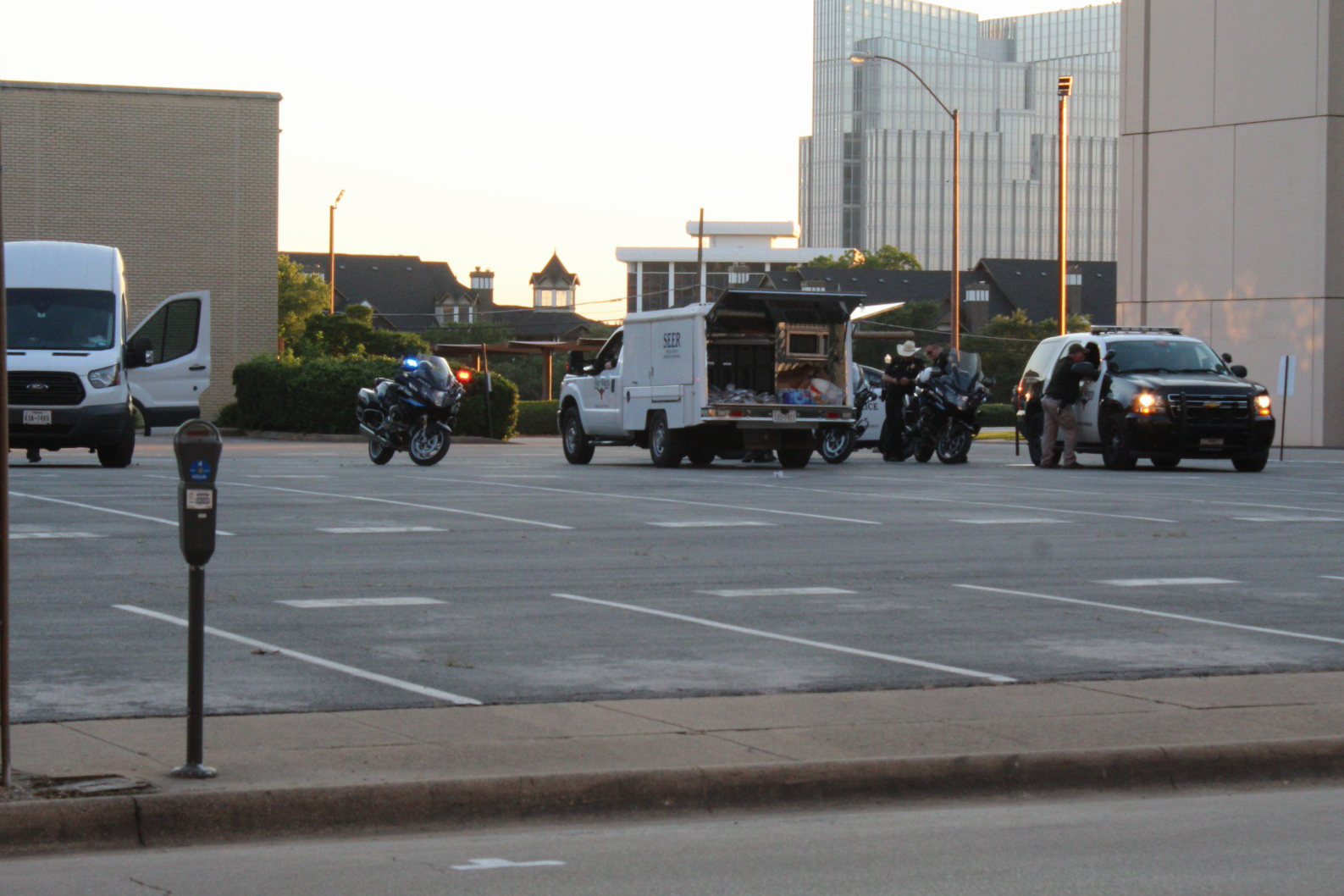
Through a public statement, United Fort Worth is asking reform-minded voters to vote against Prop A, which renews the fund for the Crime Control and Prevention District for 10 years, on July 14. The CCPD is a sales tax-driven fund that is “aimed at reducing and preventing crime in Fort Worth,” according to the city. United Fort Worth said the fund is used to buy “tools of oppression,” including military-grade weaponry.
Studies by the Charles Koch Institute, the National Academy of Sciences, and other research groups have concluded that the militarization of law enforcement does not improve public safety but rather harms police reputation.



